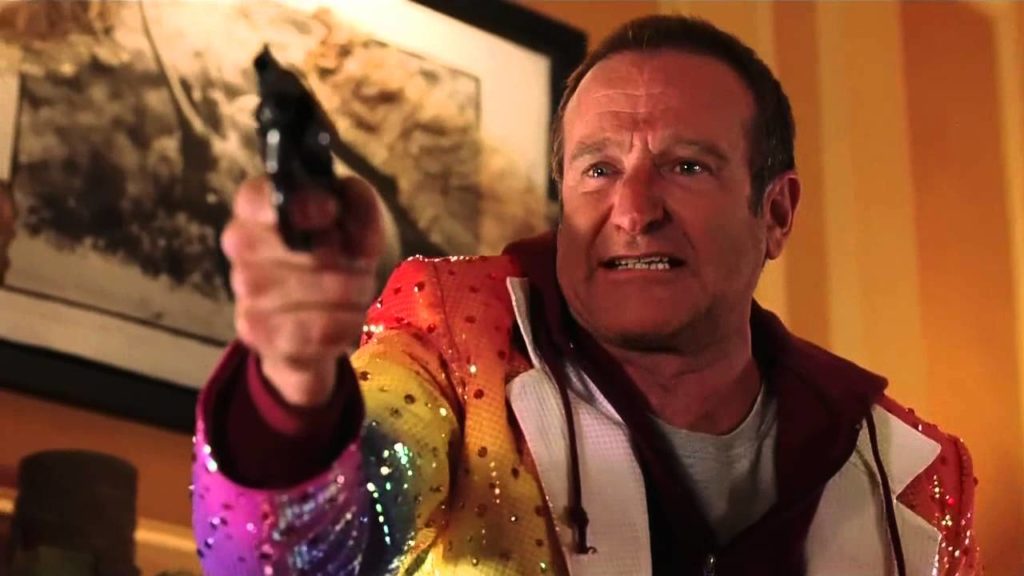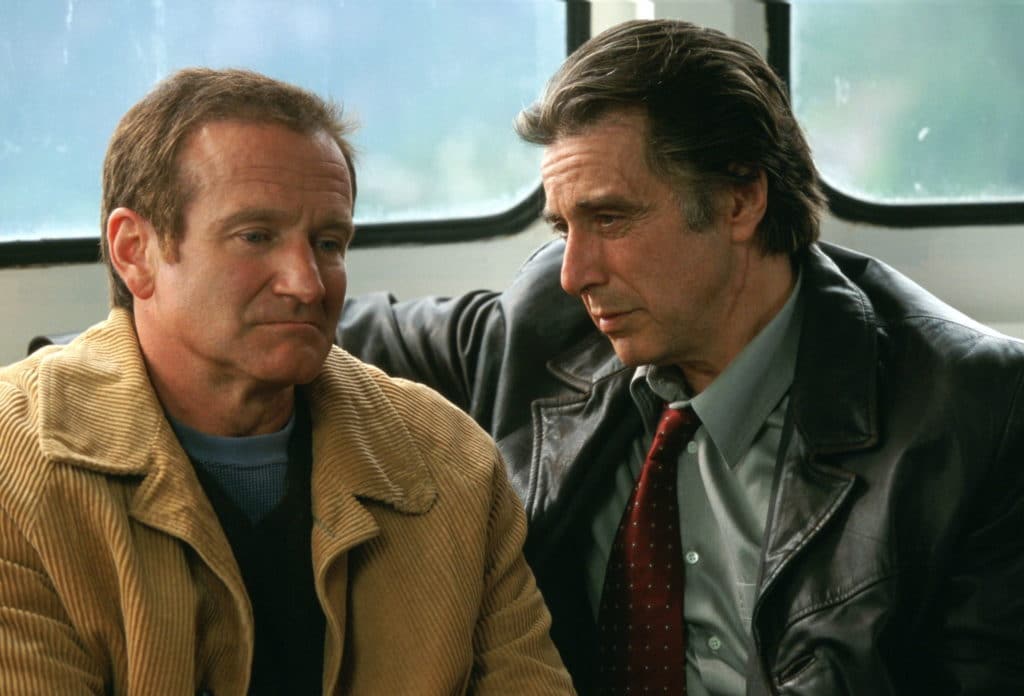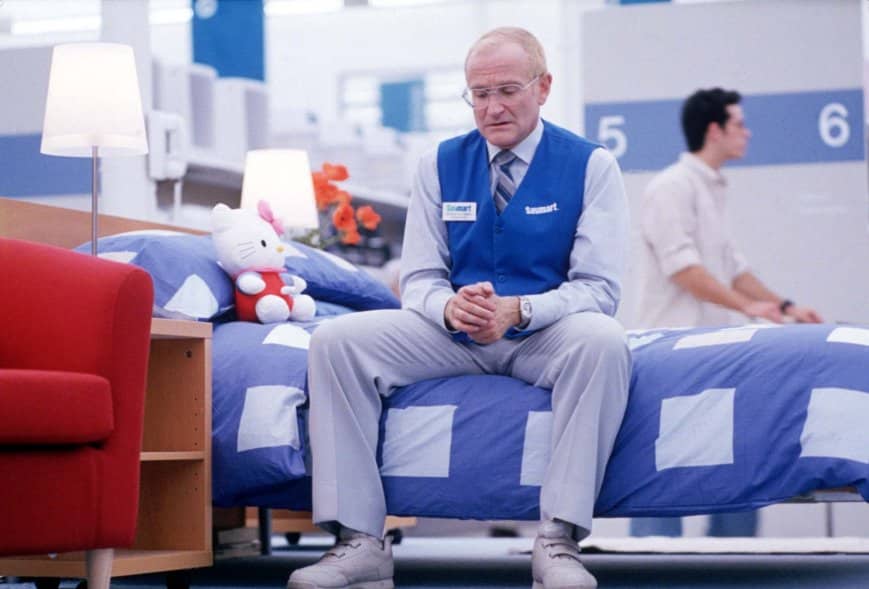Robin Williams already proved he could do serious, but in this trio of very different movies released the same year he also did creepy.
To watch footage of Robin Williams’ stand-up career is to be both amused, and a little startled. He’s a non-stop joke machine, the words pouring out of his mouth, jumping from subject to subject and impersonation to impersonation. He seems to be a man possessed, jittery, sweating, eyes wide and manic. The obvious explanation was that, up until friend John Belushi’s death in 1982, Williams was famously addicted to cocaine. More than that, though, and what would be the thread that ran through virtually his entire career, was an aggressive, occasionally off-putting need to entertain, at all times. When Williams did comedy, whether on stage or in films, his dial was almost always stuck on 11.
Sometimes this frenetic energy worked to excellent effect, such as in Aladdin. But too often it resulted in a run of exhausting yet mediocre movies like Father’s Day, where Williams and co-star Billy Crystal seemed to be engaged in a competition over who could serve up the biggest pile of ham. Even in the relatively charming Mrs. Doubtfire, he’s so relentlessly “on” that you can absolutely understand why Sally Field would divorce him. Williams eventually became synonymous with the image of a desperate for approval theater kid, as presently exhibited by James Corden, only (in Corden’s case) without the talent.
So often were his comedy roles met with either delight or dismay that whenever Williams proved himself remarkably astute at low-key dramatic roles, audiences reacted with surprise, each time the very first time. When he won a Best Supporting Actor for Good Will Hunting in 1998, it was actually the fourth time he was up for an Oscar, and far from the first time he had played such an “against type” role. His second major film appearance was the titular character in 1982’s feel bad movie of the year The World According to Garp, though he was overshadowed by John Lithgow, and a young upstart direct from Broadway named Glenn Close. In fact, Williams would often take it down several dozen notches throughout his career, often resulting in some of his best performances.

Now, to be fair, it also occasionally resulted in some of the worst, most mawkish movies in his filmography, such as Patch Adams, Bicentennial Man, and the Francis Ford Coppola debacle Jack. But even then Williams was trying something, dropping the antics for a little while and allowing the warm-hearted, loving human being he was off-camera to shine through, when he could have easily spent his entire career doing a “funny Black man” or “funny gay man” voice.
And then, in 2002, he tried something really different.
Williams isn’t the main villain of Death to Smoochy, he’s merely one of many, among corrupt businessmen and dueling mafia families. His character, disgraced kids’ show host “Rainbow” Randolph Smiley, is certainly the most volatile of the many people who mean to do the good-hearted but naive Sheldon Mopes (Edward Norton) harm, mostly because he has nothing motivating him but pure rage. Though he loses his job after getting caught taking bribes from parents in exchange for featuring their children on his show, he views Sheldon, his eventual replacement, as the sole agent of his downfall, and makes it his life’s mission to destroy him.
Williams’ standup, while very funny, was also occasionally a little hard to watch, as if looking at a man on the verge of a nervous breakdown. Here, he really amps that up. Rainbow Randolph is a bit of a buffoon, but a buffoon with nothing to lose, and one who’s gone almost blind with fury. Given the black as pitch tone of Death to Smoochy as a whole, it’s entirely possible that he might actually kill Sheldon, a tension that doesn’t let up until well into the third act of the movie, when they abruptly join the same side. It’s the kind of cynical, mean-spirited comedy in which the laughs are immediately followed by a twinge of shame (though it is, to be clear, very, very funny), and Williams’ “ha ha ha oh shit this guy really is crazy” performance is perfectly on point for it.
Even Sheldon, the closest thing the movie has to a “hero,” is an insufferable stereotype of a sniveling, ineffective liberal, the kind whose solution to every grave injustice inflicted upon the country is “vote blue no matter who.” It’s easy to see why Rainbow Randolph hates him, even though none of what happens to him is Sheldon’s fault. Williams, directed by Danny DeVito, took his ability to make audiences immediately on his side and twisted it into something dark and unsettling–how can we think he’s capable of such terrible things, when he’s usually so lovable? Even at the end, when Rainbow Randolph helps save Sheldon from the many individuals who mean to do him harm, he’s not magically cured of whatever mental illness ails him. When a policeman asks him if he’s okay, he admits “I don’t know. I’m kinda fucked up in general, so it’s hard to gauge.”

In Insomnia, released just two months later, Williams doesn’t even appear on screen until more than an hour. Unlike Rainbow Randolph, who comes into every scene bellowing like a wounded steer, his character here, mystery novelist/stone cold killer Walter Finch, never once raises his voice. He’s thoroughly unruffled, even when chased down by L.A. detective Will Dormer (Al Pacino), dispatched to a remote Alaskan fishing village to investigate the murder of Kay Connell, a high school student with whom Finch claims to have had a “special friendship.”
When Dormer catches up with Finch (although it seems more likely that Finch allowed himself to be caught, as part of some strange game), Finch claims that Kay’s death was an accident. Given the cool and calculating way he handles the situation, however, right down to coming up with a plan to plant evidence implicating Kay’s abusive boyfriend, this seems unlikely. He also easily draws Dormer, punch-drunk after days without sleep, into a quid pro quo arrangement, in which Dormer will help Finch evade suspicion, while Finch won’t tell anyone that he witnessed Dormer accidentally shoot and kill his partner, who was about to turn on Dormer in an Internal Affairs investigation. Finch even has the presence of mind to record his initial conversation with Dormer, holding the recorder over his head with a triumphant “ain’t I a stinker?” smirk. By all appearances, the soft-spoken Finch may live a solitary life, but he’s quite confident in his ability to always have the upper hand in any situation.
As part of his strange game, Finch begins calling Dormer in the middle of the night, correctly expecting him to be awake. Like Dormer, he’s an outsider, and finds adjusting to weeks of constant daylight torturous too. His conversations with Dormer are one part confessional, and one part trying to act as both Dormer’s therapist, and, in some small bizarre way, his friend. Dormer eventually welcomes the calls, for no other reason than because listening to Finch talk helps pass the endless time when Dormer should be sleeping, but can’t. Finch, of course, knows this when he tells Dormer “Nothing is lonelier than not sleeping. Feels like the whole fucking world’s deserted.”
What Finch is hiding behind his calm, even soothing demeanor is perhaps the most chilling part of Insomnia. To the very end, he remains a cipher–we don’t know where he’s originally from, if he’s ever hurt anyone before, or if Walter Finch is even his real name. Williams’ normally pleasant face is an impassive mask here, revealing nothing. There’s none of his showboating either, which began to turn audiences away from some of his comedies by this point. In fact, both he and Pacino, also known for chomping on scenery like it’s covered in A-1 steak sauce, are the pictures of restraint here. Directed by Christopher Nolan in his second feature, they seemed to acknowledge that the film’s overall somber, muted tone wasn’t a good backdrop for their usual theatrics. They’re unforgettable performances in a film that, despite its modestly successful box office performance and critical acclaim, has sadly faded into the ether over time.

One Hour Photo, Robin Williams’ final film of 2002 (it must be restated that all of these remarkable performances were in the same year), features perhaps his most complicated character, someone who’s an unsettling combination of pitiful and menacing, and whose pathological need for approval and some sense of a family turns to something twisted and corrupt. Directed by Mark Romanek, it’s a hard watch, not just for the sense of “there but for the grace of God go I,” but because it’s easy to see how Williams may have lifted some of his own personal need to make audiences love him and apply it to such a dark role.
The first thing you notice about Sy Parrish (Williams) is how strange he looks. Not ugly, just…strange. With his white-blonde brush cut and pinkish complexion, he looks unformed, fetal. His shy, awkward personality only enhances the sense that he might have hatched out of an egg yesterday, or is an alien wearing human skin, and doing a bad job of fitting in. Sy has no family, no friends, and no outside interests. He is, however, devoted to his job at a one hour photo counter in a big box chain store, a job he must know is on the edge of extinction, but makes it his sole source of meaning and purpose anyway, describing it as a “vital service.”
Sy becomes attached to the Yorkins, a family who are among his most frequent customers, particularly wife and mother Nina (Connie Nielsen) and her young son, Jake. It’s important to point out that Sy’s interest in Nina is neither romantic or sexual. He’s not looking to replace Nina’s husband, Will (Michael Vartan). He wants to be part of their family, Uncle Sy, with a place at their table for holidays and birthdays. Sy is so obsessed with this fantasy of family and acceptance that he’s been secretly making copies of the Yorkins’ photos to keep for himself, creating a tribute wall in his sad little apartment, where he pretends he was there for everything.
By god does Robin Williams make you feel some strange, perhaps misplaced sympathy for such a deeply disturbed character.
It’s also important to point out that what makes One Hour Photo even eerier to watch in the present is its foreshadowing of parasocial relationships, a disturbing off-shoot of social media and influencer culture. Though the Yorkins make polite small talk with Sy (inasmuch as he’s capable of small talk), they really don’t know him at all. Thanks to seeing the hundreds of little windows into their lives, however, Sy thinks of himself as the Yorkins’ friend, someone who knows them intimately. Like family.
When Sy discovers irrefutable proof that Will is cheating on Nina, he’s not pleased or excited. He’s at first sorrowful, then enraged, as if Will was unfaithful to him too. To Sy’s perception, Will is destroying the family dynamic that Sy so desperately wanted to be a part of, and the only proper punishment is humiliation. He follows Will and his mistress to a hotel, where he barges into their room and forces them at gunpoint to pose in sexual positions while he photographs them. Later, it’s discovered that the photographs are of things in the hotel room, rather than Will and his mistress. Sy, in a way, averted his eyes at the last minute, not wanting proof of his ruined dream.
Now, let me be clear for a moment. Sy is a villain. A villain who, most likely, doesn’t really have it in him to physically hurt someone, but dangerous nonetheless. Though he heavily implies that he was sexually victimized by his father as a child (which explains his pathological desire to recreate some sense of a traditional family), it’s no excuse for terrorizing people. Nevertheless, by god does Robin Williams make you feel some strange, perhaps misplaced sympathy for such a deeply disturbed character. The normally merry twinkle in his eyes looks like desperation, and his body language is that of someone who is constantly expecting to be hit. It’s a remarkable transformation, and one that should have gotten him another Academy Award nomination. Sadly, Good Will Hunting would remain his final shot at it.
Though Insomnia and One Hour Photo met with critical acclaim and modest success (the less said about Death to Smoochy in either regard, the better), Williams would only play a villain one more time, in a chilling 2008 episode of Law and Order: Special Victims Unit. He mostly stuck to generic comedies like RV and Old Dogs, both of which were box office hits but critical flops, and bland dramas like August Rush and The Butler. Every now and then he would try something interesting again, though, as with the black comedy World’s Greatest Dad, about a man who finds that his life exponentially improves after the accidental erotic asphyxiation death of his awful teenage son, and which would end up being one of the best movies in the last decade of his life. Robin Williams more often than not (and savvily) chose what he thought would land best with audiences, but his hard left turns are the true gems of his filmography. His skill in making flawed, loathsome characters interesting, faceted, human, was constantly underestimated.